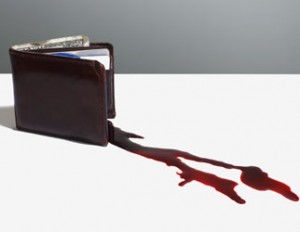Debt priorities
Putting extra cash towards your debts is admirable, but Bruce Sellery warns doing so without a proper plan can cost you money.
Advertisement
Putting extra cash towards your debts is admirable, but Bruce Sellery warns doing so without a proper plan can cost you money.
 Question
I am a 30 year-old single woman. I have a good job and am one of the lucky ones with a defined benefit pension plan. I purchased my first house about 18 months ago and in addition my mortgage, I have a $5,000 loan from my RRSP under the Home Buyers’ Plan, $17,000 in student debt, a $7,000 car loan, and $9,000 in credit card debt. I do not have any difficulty making my payments. In fact, I regularly make additional payments on my car loan and credit card. I have even increased my student loan payment. I have about $2,500 in my RRSP and $1,500 in savings. Should I be contributing to my RRSP?
Answer
You are not going to be single for long. You just need to find a way to work “financially responsible” into your online dating profile, alongside a reference to how much you “love Sunday football” and you’ll be all set.
Okay, the former might not improve your dating life and the latter might not be true. But you should definitely celebrate all the things that you are doing right when it comes to your money. You have a good job with a pension, you own your own home and you’re aggressively repaying your debt.
The biggest bang for your buck
Now that you’re done patting yourself on the back, we need to have talk about priorities. Your approach to debt repayment is admirable, but scattered. Let’s think through what you should be paying down first, so that you get the biggest bang for your buck. There are two principles to keep in mind:
Question
I am a 30 year-old single woman. I have a good job and am one of the lucky ones with a defined benefit pension plan. I purchased my first house about 18 months ago and in addition my mortgage, I have a $5,000 loan from my RRSP under the Home Buyers’ Plan, $17,000 in student debt, a $7,000 car loan, and $9,000 in credit card debt. I do not have any difficulty making my payments. In fact, I regularly make additional payments on my car loan and credit card. I have even increased my student loan payment. I have about $2,500 in my RRSP and $1,500 in savings. Should I be contributing to my RRSP?
Answer
You are not going to be single for long. You just need to find a way to work “financially responsible” into your online dating profile, alongside a reference to how much you “love Sunday football” and you’ll be all set.
Okay, the former might not improve your dating life and the latter might not be true. But you should definitely celebrate all the things that you are doing right when it comes to your money. You have a good job with a pension, you own your own home and you’re aggressively repaying your debt.
The biggest bang for your buck
Now that you’re done patting yourself on the back, we need to have talk about priorities. Your approach to debt repayment is admirable, but scattered. Let’s think through what you should be paying down first, so that you get the biggest bang for your buck. There are two principles to keep in mind:
Organize your info: The first thing you need to do is write down your outstanding debts along with their interest rates and minimum monthly payments. Here is an example using made-up numbers.
| DEBT | OWING | INTEREST | MIN. PAYMENT |
| Credit card | $9,000 | 20% | $340 |
| Car loan | $7,000 | 8% | $300 |
| Student loan | $17,000 | 6% | $500 |
| Mortgage | $150,000 | 3.5% | $600 |
| RRSP Home Buyers’ Plan | $5,000 | 0% | $50 |
Set up automatic minimum monthly payments: You have already done this on your mortgage and likely your Home Buyers’ Plan. But I’d consider taking your student loan payment back down to the minimum because it is likely at a much lower rate than your credit card.
Focus every extra penny on your highest rate debt: Now, instead of increasing your student loan or car loan payments, focus everything on eliminating your credit card debt. Once that is done, move on to the car loan, and on and on. Just be aware of restrictions. Sometimes you aren’t allowed to pre-pay too much— for example mortgages often have some restrictions on lump sum payments.
Hold off on RRSP contributions: Because you have a defined benefit pension plan, you can afford to hold off on RRSP contributions for now and focus on debt repayment instead. I know that was your actual question and I took forever to answer it. Sorry about that, but worth it, right?
Focus on saving versus mortgage: The last point I will make is that, once you have other debt paid off, it makes more sense mathematically to put extra cash into your TFSA or RRSP instead of paying off your mortgage. This is because mortgage rates are so low—and you can get a higher rate of return in other areas. That said, some people really value the emotion benefit of being mortgage free, so that trumps rate of return.
My challenge to you Once you have your credit card paid off in full, my challenge to you is to never again hold an outstanding balance on it. Set up a line of credit secured against your home and use that in emergencies if you really need to. But pay off your credit card in full every month. Promise?Share this article Share on Facebook Share on Twitter Share on Linkedin Share on Reddit Share on Email